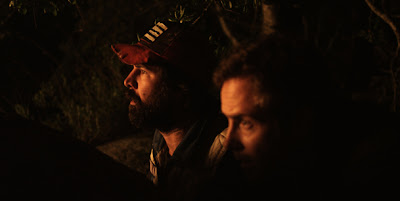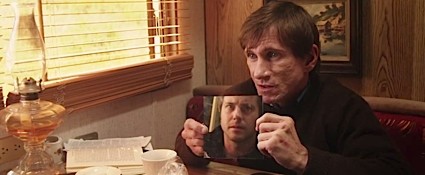Forums
Horror Movie Talk
13 Question Marks of Horror with Resolution's Justin Benson and Aaron Moorhead

1. What experience or movie got you into horror?
A: I don’t like certain genres of movies – I just like good movies. Justin and I always are drawn to the “cinema fantastique” thing, but I think it’s just a general fascination with the unnatural that does it, no one thing.
J: Love all films, and all genres, but in horror The Devils’ Backbone and the Preacher comic series are way up there. I love the rebelliousness of the horror genre, and that it welcomes the most freedom and invention. It’s the punk rock of cinema. There is nothing better than making people laugh, cry and scaring the shit out of them, and if the marketing department has to stick that in a category, it’s gonna’ be horror. Also, we’ve met a lot of our horror filmmaker peers out on the fest circuit and they are a fricking amazing group. The future of filmmaking is looking really exciting, and a lot of that is because of what’s happening in horror right now. Everyone is pushing the boundries. Hard to even narrow it down, but Citadel, American Mary, The Innkeepers, Insenbles are just a few that kicked my ass recently. And all the people that made V/H/S are fucking heroes.
2. Growing up, were you the “weird kid” or was your upbringing pretty normal?
A: I used to be a relatively isolated kid: overweight, into video games and unable to get a date. But my upbringing was perfect (my parents are awesome, thank you very much!). I read a lot of Stephen King pretty early, though – that probably messed me up right good.
J: Where I grew up in San Diego if you didn’t play football, basketball or were a wanna-be gangster you were a “weird kid”. I doubt anyone gave a shit I was reading Frank Miller, watching Linklater movies, and spending my Friday nights at punk rock shows, but me and my amazing small group of friends got jumped more than once for being the surfer/skater/snowboarders trying to meet girls at parties. I found out when I moved away maybe all that stuff wasn’t normal.
3. When did you decide you wanted to be story tellers?
J: I recently had to choose between medical school and telling stories. I chose telling stories because I love it more than anything and have discovered it’s actually an important thing. A: This wasn’t slow, it was like a lightning bolt for me: I was 14 years old and I met a talented friend named Aaron Higgins. He and his brother Julian would make these amazing stop-action videos with Star Wars figures. I got hooked so fast, and that’s that. We’re actually now all in the industry and work together often still, both very close friends.
4. Aaron, you worked across the board in the industry. Was directing always your goal?
A: I love the visual de of filmmaking quite a bit, so naturally, being a cinematographer and VFX artist is important to me, but the intention has always been to direct. Being in a co-directing team is perfection, because I don’t have to lose being the cinematographer in exchange for directing, or take on more than I can handle at once. It’s like having four hands and 48 hours in the day.
5. Do you want to continue as a cinematographer, or re-establish yourself solely as a director?
A: Hell yeah I want to keep shooting! If I get to direct and DP at the same time, that’s the good life. Hopefully in the future (as filmmaking changes) I can take breaks from directing to go shoot movies for my friends. And spend hundreds of millions of dollars making dinosaurs fight robots and stuff.

6. Justin, You started off by doing the short, A.M., How different was it jumping into a feature?
J: Aaron and I both have done so many little do it your self short films, low budget commercials, muc vids, and new media stuff, that it didn’t feel like that big of a jump. There’s a shit ton more to learn on the buness de of features, but the craft/art whatever is the same, on a feature you just get to do it for a whole bunch of censecutive days with the same people you love. There is nothing bad about having the honor of directing a movie you have creative control over, and if you have anything to complain about the experience you just sound like a dick.
7. There aren’t a lot of directing teams in horror. How did you guys come together?
A: We met at Ridley Scott’s commercial production company – as interns, not high-powered directors. They let us move mail around and sometimes get lunch for people, it was awesome. It was my (Aaron’s) first day and Justin’s last day, and like two ships crosng in the ocean, really hit it off. Worked on more and more projects together, one thing leads to another, suddenly, BAM. We have a baby and name it Resolution.
8. What is your writing process like when working together?
J: I try to write at least 6 pages a day, but when I really dive into a new feature I lock myself up for weeks at a time and set a page or scene quota. It’s not fun or a spiritual experience or anything, but obviously hugely gratifying, and discovering what you can scrape off the de of your brain is pretty fucking crazy. Writing is hard work like any other job, but it’s extremely cool to have Aaron reading draft after draft giving magical notes, developing the material, and know how lucky we are to do what we do for a living.9. Can you tell me about the genes of Resolution?
J: It was several things. One was that I never knew anyone growing up who went to a cabin in the woods with a bunch of hot girls to drink beer. Everyone I ever knew who went to the boonies of San Diego went to smoke crack, shoot guns and avoid paying their taxes. But more importantly, Resolution was created to exploit the dynamic between me, Aaron, Vin and Pete. During a low budget beer ad we discovered how well we work together so we decided to stop talking about making a feature and just do it. Also, I had the money to finance it in my checking account and was afraid if I didn’t spend it immediately I’d get hit by a fucking car or something and have to pay hospital bills.
A: The genes for me was Justin saying “Hey man, I know you want to get more into directing, so I have this killer script we’ve been working on and the rockstar cast from that other thing and the full budget and a location and total creative control, would you please co-direct with me?” What the hell did you want me to say? I said thank you, I tried to call him Jesus but Justin kept insting he’s just a man.

10.
From script to final product, did the story change much due to restrictions (financial or creative)?
J: No. Again, Aaron and I have both been making films for so long the script was tailored to achieve everything we could without ending up with scenes that look like little kids impersonating Spielberg or something. The whole movie was constructed from day one to push everything as far as we could with the resources available to us, without, for example, disrespecting the art of Make-up FX and cheapening the story by putting a bunch of fake looking gore.11.
Are all the effects in Resolution practical, or do you use CGI for any shots?
J: Aaron is literally a visual effects genius. Some of the effects are practical, some are CG. Aaron is so good no one has ever been able to tell which is which. He’s a fuckin’ VFX G’ in addition to being a skull crunchingly badass cinematographer.
A: Some are CGI, but you’ll have to guess which. A gentleman never tells.
12.
It can be a nervous experience, the first time your film is shown in public. What was it like to watch with an audience for the first time?
J: Just fucking rad, but specifically seeing that the scary stuff worked. The funny stuff we knew we had, the dramatic stuff too. Pete and Vinny are genius actors—can’t stress enough how much this is not bullshit… geniuses-- so we knew we had that. But scary stuff is created so much in writing and post-production you don’t know if all that theoretical stuff works until you see the audience shifting in their seats. There was this girl in Paris who left the theater trembling. Felt so, so fucking good.
13.
What’s next for you two as a team?
J: Enough to fill 15 hour days, 7 days a week, but by far most importantly, three new features that will break your heart while making you laugh and scaring the shit out of you.
A: I don’t know what he’s talking about, I’m quitting filmmaking to pursue my real pason: owning oil companies. It’s too easy to make money in filmmaking and I want a challenge.

Doesn't it make you want to see Resolution?
Keep an eye out for the film and these two directors. You won't be disappointed!
sinful Celluloid
Friday 11/09/2012 at 02:46 AM | 97694
